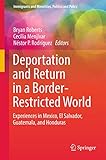Deportation and return in a border restricted world: experiences in Mexico, El Salvador, Guatemala, and Honduras / Bryan Roberts, Cecilia Menjívar, Néstor P. Rodríguez, editors
Roberts, Bryan [editor] | Menjívar, Cecilia [editor/a] | Rodríguez, Néstor P [editor/a].
Tipo de material: Libro
impreso(a)
Series Editor: Geneva, Switzerland: Springer International Publishing, 2017Descripción: xiii, 187 páginas : retratos ; 24 centímetros.ISBN: 3319497774; 9783319497778.Tema(s): Siglo XX
Libro
impreso(a)
Series Editor: Geneva, Switzerland: Springer International Publishing, 2017Descripción: xiii, 187 páginas : retratos ; 24 centímetros.ISBN: 3319497774; 9783319497778.Tema(s): Siglo XX| Tipo de ítem | Biblioteca actual | Colección | Signatura | Estado | Fecha de vencimiento | Código de barras |
|---|---|---|---|---|---|---|
| Libros |
Biblioteca Campeche
Texto en la configuración de la biblioteca Campeche |
Acervo General | 304.8 D4 | Disponible | ECO040006778 |
Part I Introduction.. Voluntary and Involuntary Return Migration.. Migration Times and Ethnic Identity: Mexican Migration to the US Over Three Generations.. Part II Voluntary and Non-Voluntary Return.. From Mexico to Hawaii: Tracing the Migration History of One Family in Esperanza, Jalisco.. Driven "Home": Stories of Voluntary and Involuntary Reasons for Returning Among Migrants in Jalisco and Oaxaca, Mexico.. Return Migrants and Potential Challenges for Future Legal Migration: Guatemalan Cases.. Part III Deportation.. Fragmented Identities: Contention of Space and Identity Among Salvadoran Deportees.. Trapped at the Border: The Difficult Integration of Veterans, Families, and Christians in Tijuana.. Displacing Lives and Closing Pathways to Hope: The Health Impacts of Deportation and Return Migration in El Progreso, Honduras.. Part IV The New Disappeared.. Never to Return: The New Disappeared of El Salvador.. Index
This volume focuses on recent experiences of return migration to Mexico and Central America from the United States. For most of the twentieth century, return migration to the US was a normal part of the migration process from Mexico and Central America, typically resulting in the eventual permanent settlement of migrants in the US. In recent years, however, such migration has become involuntary, as a growing proportion of return migration is taking place through formal orders of deportation. This book discusses return migration to Mexico, Guatemala, El Salvador and Honduras, addressing different reasons for return, whether voluntary or involuntary, and highlighting the unique challenges faced by returnees to each region. Particular emphasis is placed on the lack of government and institutional policies in place for returning migrants who wish to attain work, training, or shelter in their home countries. Finally, the authors take a look at the phenomenon of migrants who can never return because they have disappeared during the migration process. Through its multinational focus, diverse thematic outlook, and use of ethnographic and survey methods, this volume provides an original contribution to the topic of return migration and broadens the scope of the literature currently available. As such, this book will be important to scholars and students interested in immigration policy and Latin America as well as policy makers and activists. eng
